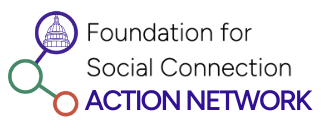In May, United States Surgeon General Dr. Vivek Murthy released “Our Epidemic of Loneliness and Isolation,” an Advisory warning about the public health crisis that loneliness, isolation, and disconnection pose to the American public. Loneliness and isolation are widespread, with approximately half of adults in the United States experiencing measurable levels of loneliness. Disconnection fundamentally affects our mental, physical, and societal health. In fact, loneliness and isolation increase the risk for individuals to develop mental health challenges in their lives, and lacking connection can increase the risk of premature death to levels comparable with smoking daily.
The scope of the challenge
Loneliness and isolation have become more prevalent as social connection declines. In 2021, almost half of Americans reported having three or fewer close friends, compared with just 27% reporting the same in 1990. Recent studies show that social isolation and loneliness are a growing issue for youth. The rate of loneliness among young adults increased every year between 1976 and 2019.
Loneliness and low emotional support are also associated with an increased risk of self-harm and suicidal thoughts. Multiple studies have found that an increase in loneliness was reported among the primary motivations for self-harm — independent of depression. Finally, poor or insufficient social connection is associated with an increased risk of disease, including a 29% increased risk of heart disease and a 32% increased risk of stroke.
Elevating social connection to a national priority
In addition to improving individual health, increased connection also strengthens communities and societal health. Growing evidence suggests that in communities where people know one another and are connected to community institutions — like service organizations, religious groups or community-based organizations — they prepare for, respond to, and recover more quickly from natural hazards than those with lower levels of social connection. Higher levels of connection within communities are also associated with less violence: Even one level of increase in social connectedness was associated with a 21% reduction in murders and a 20% reduction in motor vehicle thefts
The Framework for a National Strategy to Advance Social Connection is a first-of-its-kind set of recommendations for actions that will address the public health problem of social disconnection and strengthen social connection. It describes six pillars to promote connection as a national issue:
- Strengthen social infrastructure
- Enact pro-connection public policies
- Mobilize the health sector
- Reform digital environments
- Deepen our knowledge
- Cultivate a culture of connection
Recommendations for individuals
By taking small steps every day to strengthen our relationships, we can rise to meet this moment together — and improve our health. On an individual level, you can:
- Invest time in nurturing your relationships through consistent, frequent and high-quality engagement with others.
- Draw boundaries on time spent with technology to protect meaningful in-person time with the people in your life.
- Seek out opportunities to serve others or participate in community service.
- Seek help during times of struggle with loneliness or isolation by reaching out to a family member, friend, counselor, or health care provider or by calling or texting 988 to connect with the nationwide Suicide and Crisis Lifeline.
How we’re taking action
As an enterprise focused on improving health for our members and the communities we serve, we’re committed to addressing social isolation and loneliness. We’ve engaged with the Foundation for Social Connection — a key contributor to the development of the Advisory — and have UnitedHealthcare Community & State representation on the Coalition to End Social Isolation & Loneliness Steering and Policy Committees. Work is underway to provide health plans with resources and tools to address social isolation and loneliness. To learn more about the Foundation for Social Connection’s efforts to create more socially connected communities, visit their website.
As we work to recover from the pandemic — stronger than before — rebuilding the social fabric of our communities is a crucial public health priority. Fostering greater connection requires widespread individual and institutional action and demands sustained investment, effort and focus. We’re committed to the cause and stand ready to work in the community to strengthen social connection in communities throughout the country.
Blair Harrison is Policy Director of Community & Social Health, UnitedHealthcare Community & State. Andy McMahon is Vice President of Impact Investments, UHG Office of Health Equity. Jillian Racoosin is Executive Director and Rosalee Blalock is Implementation & Innovation Program Manager with The Foundation for Social Connection and Coalition.

